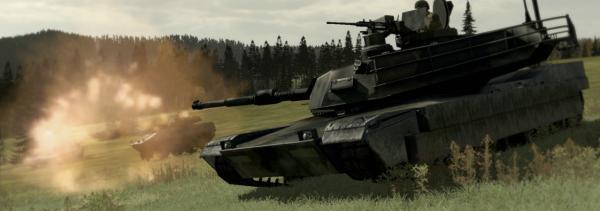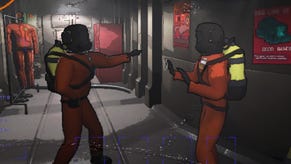Bohemia: There's Only One Real Flashpoint Sequel
And it's ArmA2. This is fascinating. The situation where a developer keeps the technology and the publisher gets the name is common enough. There's always obvious competition between the keeper of the flame and the keeper of the name (e.g. Football Manager versus Championship Manager, Far Cry 2 versus Crysis, etc). But Bohemia, in a recent press-release, have made that incredibly explicit. To quote the opening: "Is the upcoming Codemasters game really 'the much anticipated return of the genre-defining military conflict simulator' Operation Flashpoint: Cold War Crisis? Is it really 'the official sequel to the multi-award winning Operation Flashpoint: Cold War Crisis'? Bohemia Interactive says: 'No! What matters is the game, not the name.'" Seeing Bohemia's fury at Flashpoint 2 being described by Codemasters as the "return of" or "official sequel to" is without precedent in recent gaming history. Read the whole thing for more. Crikey.
We took the opportunity to chat to Bohemia CEO Marek Spanel about the whole situation...
RPS: While the name-goes-one-way-dev-goes-another happens, it's a rare thing where we see a developer explicitly making a press release to state that? What made you decide it was time for open confrontation?
Marek Spanel: Quite likely, without knowing the full details of each situation, it’s almost certainly different in every case, as the nature of each publishing relationship is different. One recent example that may come to mind for many is with Crysis and Far Cry 2 - but even that comparison doesn't fit as UbiSoft simply acquired the entire Far Cry IP, which completely avoided such an unfortunate situation. In our case, the name stayed with the publisher, but all of the other rights of the game have remained in our hands, so the technology, the story, the design and gameplay of the original Operation Flashpoint Cold War Crisis (and Resistance and Elite) are all 100% owned by Bohemia Interactive.
As to the confrontation and timing... well, recently Codemasters have started to promote their new Operation Flashpoint (2) Dragon Rising heavily in way that we believe misleadingly publicize their game as the “official sequel” to our Operation Flashpoint Cold War Crisis so we simply expressed our view on the entire situation.
RPS: Reading the press-release you seem surprised that Codemasters chose to develop a sequel to Flashpoint. Is this correct? Is it more that they're doing it at all, or is it the deliberate claiming they are the "official" sequel. As in, if they're being deliberately aggressive so you have to respond?
Marek Spanel: Codemasters own the rights to the name Operation Flashpoint, which we’re fully aware of and we’re not claiming anything different. We’re also not surprised that they are developing a new game under the name Operation Flashpoint. In fact, for us it is additional motivation to work harder and develop a better game. But what we protest are the marketing attempts to create a strong connection between the original Operation Flashpoint Cold War Crisis and this new game of theirs, when there is no connection other than the name and similarities in the overall concept. We insist that all credit and recognition received by Operation Flashpoint Cold War Crisis really belongs to the game and not the name, thus we feel it’s inappropriate for such a legacy to be attached or implied to new unrelated game under circumstances of this particular situation, especially when it seems that Codemasters are not giving Bohemia Interactive credit it rightfully deserves.
One old Czech proverb says “a lie repeated a hundred times becomes the truth” and there is some point in it that could be applied to the gaming industry and media these days. Maybe from Codemasters it was just a series of unfortunate misunderstandings, but something is seriously wrong when in a preview on a major gaming site, one of the developers of the new game, who was never even remotely involved in the development of the original, is credited as a “veteran of the original Flashpoint team”. If you add up all such little misunderstandings, like Codemasters reps saying what “we did when we made the original Operation Flashpoint” etc. you may end up with seriously distracted image of the entire situation created in minds of journalists and gamers.
I also feel this case is somewhat interesting in more general way than only this particular situation between two particular companies. Not so much for gamers, they simply will play games they like and enjoy, but more for the gaming industry. I think it raises some interesting questions with the main one being: Is it really enough for this industry just to stick a name on a box to claim it's “the official sequel”? Are games really just “franchises” or is there something more in them, something that could be considered an art form?
RPS: Did you attempt to talk to Codemasters before releasing the press release?
Marek Spanel: No we didn’t, usually we would prefer to resolve problems in private, but after some of the recent "behind the scenes" movements there wasn't really much space left to talk... The press release covers the situation only partially and is focused only on matters we feel really need to be said publicly.
RPS: As an example of a developer in a similar situation and choosing to take an alternative direction, Monolith ran a competition for the readers to choose the name to their "real" sequel to FEAR. As well as playing to the fanbase, it introduce the idea to a lot of gamers that the "real" sequel of FEAR wasn't actually what their publisher was making. Of course, in the end, they managed to get their name back, but it's an interesting tactic to take. Did you consider something less confrontational?
Marek Spanel: As mentioned before, I don't believe that it’s really possible to draw parallels from the past situations of other developer facing a similar situation, all developer/publisher relationships are unique and what may seem on paper to be similar from an external perspective is rarely similar in its actual nature. Of course we considered other options, and I believe some of them were fairly smart, but the surprising turn of events, just a few days after we’d already started preparations for that plan, meant we had to completely re-think our strategy in order to avoid some serious threats to our company. However, some of our plans that are more creative still may happen in future.
RPS: It's an interesting thing - if you follow the situation where a game's name went one way and the actual developers (and often their engine) went another... well, the developer almost always wins. The only even *draw* I can think of is Far Cry 2 and Crysis. What do you think of that? History seems to be on your side.
Marek Spanel: Well, perhaps Crytek were a little smarter or a little luckier than us in this case as they had benefits from both titles due to way how it was handled. Also, in contrary to what you say I would estimate that Far Cry 2 sold substantially more copies, at least because of the platforms it was published for. And if you compare the marketing and PR support that Crysis received, with what we have for ARMA II, you would see another significant difference.
That said, it will be very interesting to see the final round of the duel between our game and Codemasters’ new game, as both try to build upon the original Operation Flashpoint in one way or another. We are putting as much effort and passion into ARMA II as we did for the original game, and I am sure our competition at Codemasters is also trying hard to come up with a remarkable experience, which is a win-win situation for everyone, especially for gamers. Despite our company’s track record, in terms of sales of the original Operation Flashpoint Cold War Crisis, as well as awards and recognition both in the press and from the gaming community, we really are back to being the underdogs again, so we’re in the position where we can only surprise the gaming audience, but we shall see where everyone stands when the dust settles, as the rhapsody goes: “I am just a poor boy, I need no sympathy, because I am easy come, easy go, a little high, little low, anyway the wind blows, doesn’t really matter to me...”, to end on classic Queen quote. After all, it doesn't matter if history or anything else will be on our side, unless gamers are. That simply depends on how good game we will manage to create and there also goes most of our efforts. This public statement is very insignificant to the final quality of our next game anyway.
RPS: Thanks for your time.









